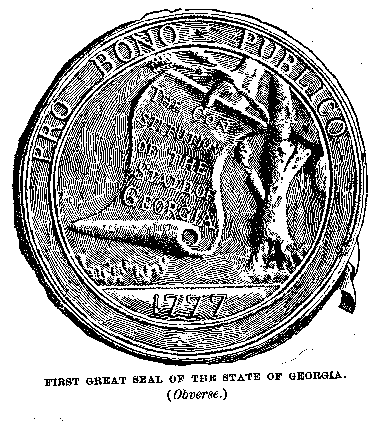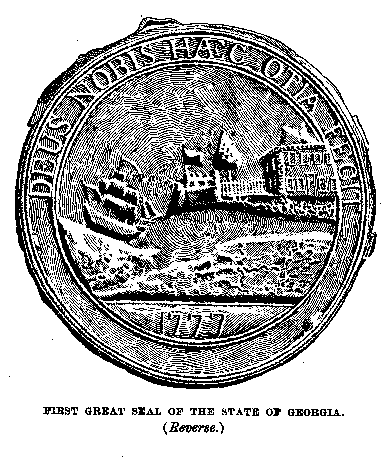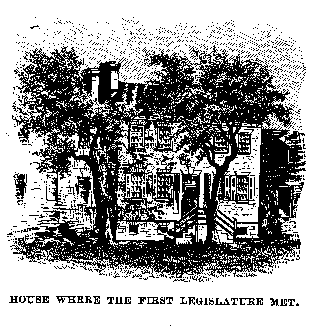EPOCH IV.
Georgia an Independent State, 1776-1789.
CHAPTER XVI.
THE CONSTITUTION OF 1777 --- PERMANENT STATE
ORGANIZATION.
"We therefore, the representatives of the people, from whom all power originates and for whose benefit all government is intended, by virtue of the power delegated to us, do ordain and declare, and it is hereby ordained and declared, that the following rules and regulations be adopted for the future government of this State." --- Extract from the first Constitution of the State of Georgia.
 In order to understand the importance of the step taken by our forefathers in the year 1776, a little knowledge of Civil Government is necessary. A Colony is a body of people planted by some government on foreign soil, with no power to govern themselves. A Province is a district in which the people have a government provided for them by the power to which they are subject, and they enjoy certain rights and privileges. A State is the whole body of people united for the purpose of government, and not in any way subject to any outside power. In some cases the people are united by a written agreement called a Constitution, but in others they are united simply by mutual consent. They must own the land upon which they live and the other nations of the world must admit their right to establish a government. England, France, and Spain are States.
In order to understand the importance of the step taken by our forefathers in the year 1776, a little knowledge of Civil Government is necessary. A Colony is a body of people planted by some government on foreign soil, with no power to govern themselves. A Province is a district in which the people have a government provided for them by the power to which they are subject, and they enjoy certain rights and privileges. A State is the whole body of people united for the purpose of government, and not in any way subject to any outside power. In some cases the people are united by a written agreement called a Constitution, but in others they are united simply by mutual consent. They must own the land upon which they live and the other nations of the world must admit their right to establish a government. England, France, and Spain are States.
When Oglethorpe brought the first English settlers to this soil he established The Colony of Georgia. When King George II., in the year 1754, gave these settlers an established form of government in which they had certain rights, but were still subjects of the king, the colony became The Province of Georgia. When the people rebelled against the authority of the king and arrested and imprisoned the governor who represented him, they organized a government for them selves. The people thus united became The State of Georgia.The form of government which they selected for the State made it a republic.
The government first established for the new State of Georgia, April 15, 1776, was temporary, because the people were not strong enough to defend their government alone, and they waited to know that they would have the support of the other twelve States in the fight with England, which was sure to come. The Declaration of Independence assured them of this support, and as soon as the news reached Georgia a convention was called to adopt a written constitution and to establish a permanent government for the young republic. This convention met at Savannah in October, 1776.
The convention adopted a seal for the State, to take the place of the old provincial which had been used by the British governors and which was emblematic of their subjection to the king. The accompanying cuts show the two sides of the seal of 1777, with the devices and mottoes.

The first constitution consisted of sixty-three articles, and provided for a governor, a legislature, and a judiciary. Members of the legislature were to be elected in December of each year, and to meet in January following. The first duty of the legislature was to elect a governor, who should serve for one year, whose title should be Honorable, and an executive council, consisting of two of the members of the legislsature from each county that had as many as ten representatives. The remaining representatives constituted the House of Assembly, which had the sole power of making laws. The speaker of the Assembly wore his hat when presiding,
The Executive Council took the place of our Senate, but did not have the same power. Laws proposed in the House of Assembly were referred to the Executive Council, which could not make amendments, but could propose them to the Assembly. A committee of the council coming into the House of the Assembly to propose any amendment had the privilege of setting with their hats on.
No Clergyman could be a member of the legislature. Every person who failed to vote in an election, except for a good reason, could be fined five pounds. Schools were to be established in each county and supported at the general expense of the State. Free toleration of all religions should be guaranteed, provided they did not threaten the peace and safety of the State.
The twelve parishes were abolished, and the State was divided into eight counties. The names of the first eight counties are Wilkes, Richmond, Burke, Effingham, Chattam, Glynn, Camden, and Liberty.

The first seven of these were named for English statesmen who had been the champions of the rights of the American colonies. The last one was so named on account of the devotion of the citizen of St. John's parish to the cause of liberty. It will be remembered that this parish alone sent a representative, Lyman Hall, to the meeting of the Continental Congress, and that two of its citizens, Lyman Hall and Button Gwinnett, had been signers of the Declaration of Independence.
The convention remained in session four months. It was the 5th of February, 1777, when the first permanent constitution of the State of Georgia was adopted. Archibald Bulloch was to continue as president until the legislature should elect the first governor.
Before the end of February President Bulloch died, and on the 4th of March Button Gwennett (see sketch, p. 101) was elected by the Council of Safety president and commander-in-chief, to serve until a governor could be elected under the new constitution. Gwinnett at once issued a proclamation ordering a special election for members of a legislature, which he called to meet in Savannah the first Tuesday in May.
Lachlan McIntosh had recently been made a brigadier-general and placed in command of the Georgia forces.
 Gwinnett had also been a candidate for the position of brigadier-general. When McIntosh was chosen Gwinnett was much disappointed. When Gwinnett became president and commander-in-chief, he resolved to ignore and humiliate his rival by heading in person an expedition against the British in Florida, who had invaded Georgia, captured Fort McIntosh, and committed other depredations. He did not allow McIntosh to accompany even his own brigade. But the expedition was badly planned, and failed in every particular.
Gwinnett had also been a candidate for the position of brigadier-general. When McIntosh was chosen Gwinnett was much disappointed. When Gwinnett became president and commander-in-chief, he resolved to ignore and humiliate his rival by heading in person an expedition against the British in Florida, who had invaded Georgia, captured Fort McIntosh, and committed other depredations. He did not allow McIntosh to accompany even his own brigade. But the expedition was badly planned, and failed in every particular.
While these things were going on, the special election for members of the legislature had been held, and the first legislature of the State of Georgia met in Savannah on the eighth day of May, 1777. Gwinnett was a candidate for the position of governor, but John Adam Treutlen was elected by a large majority. General McIntosh was much gratified at the defeat of Gwinnett, and did not hesitate to say so. This provoked Gwinnett who sent him who sent him a challenge to fight a duel. They met at sunrise within the limits of the present city of Savannah. They exchange Shots at the distance of twelve "paces"; both were wounded in the thigh. Gwinnett died twelve days after the duel. McIntosh recovered, and was transferred by the advice of his friends to the Continental army, in the western district of Virginia and Pennsylvania.
History of Georgia
Main page
You are visitor  since Dec 2014 -- thanks for stopping by!
since Dec 2014 -- thanks for stopping by!There were 1299 visitors, at our previous host from 23 Jun 2004 to 9 Aug 2011.
Last updated: 19 Jan 2015
© Copyright 2003 - 2015 - Tim Stowell
 In order to understand the importance of the step taken by our forefathers in the year 1776, a little knowledge of Civil Government is necessary. A Colony is a body of people planted by some government on foreign soil, with no power to govern themselves. A Province is a district in which the people have a government provided for them by the power to which they are subject, and they enjoy certain rights and privileges. A State is the whole body of people united for the purpose of government, and not in any way subject to any outside power. In some cases the people are united by a written agreement called a Constitution, but in others they are united simply by mutual consent. They must own the land upon which they live and the other nations of the world must admit their right to establish a government. England, France, and Spain are States.
In order to understand the importance of the step taken by our forefathers in the year 1776, a little knowledge of Civil Government is necessary. A Colony is a body of people planted by some government on foreign soil, with no power to govern themselves. A Province is a district in which the people have a government provided for them by the power to which they are subject, and they enjoy certain rights and privileges. A State is the whole body of people united for the purpose of government, and not in any way subject to any outside power. In some cases the people are united by a written agreement called a Constitution, but in others they are united simply by mutual consent. They must own the land upon which they live and the other nations of the world must admit their right to establish a government. England, France, and Spain are States.


 Gwinnett had also been a candidate for the position of brigadier-general. When McIntosh was chosen Gwinnett was much disappointed. When Gwinnett became president and commander-in-chief, he resolved to ignore and humiliate his rival by heading in person an expedition against the British in Florida, who had invaded Georgia, captured Fort McIntosh, and committed other depredations. He did not allow McIntosh to accompany even his own brigade. But the expedition was badly planned, and failed in every particular.
Gwinnett had also been a candidate for the position of brigadier-general. When McIntosh was chosen Gwinnett was much disappointed. When Gwinnett became president and commander-in-chief, he resolved to ignore and humiliate his rival by heading in person an expedition against the British in Florida, who had invaded Georgia, captured Fort McIntosh, and committed other depredations. He did not allow McIntosh to accompany even his own brigade. But the expedition was badly planned, and failed in every particular.